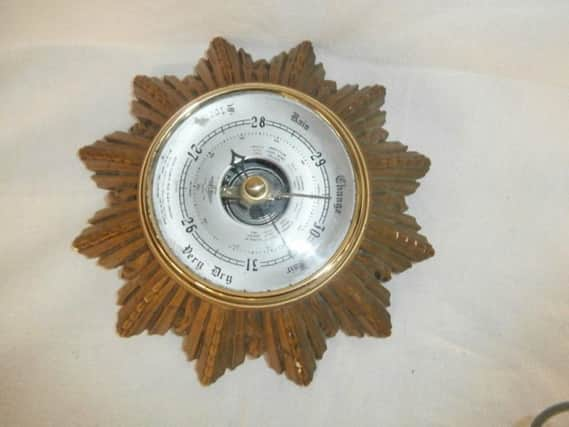Predict the future weather with this amazing antique...


So is winter nearly over? Doesn’t really feel like it yet. The lighter nights will help though and with the clocks going back on the weekend, I thought it apt to talk about a different kind of clock. Barometers. Most of our common small talk is made up of conversations about the weather, how it affects our holidays, days out and daily life. The barometer satisfied the
READ MORE: A crystal producer that's a cut above the rest...
Advertisement
Hide AdAdvertisement
Hide AdEnglishman’s obsession (including mine) with the ever-changeable weather, rapidly becoming a major article of domestic furniture.
It was first invented in Italy and was manufactured in England by Italian craftsmen.
The theory of measuring atmospheric pressure, using a column of mercury, was advocated by Evangelista Torricelli in 1643, but it was not until in 1675 that barometers were used to predict the weather. During this time it was realized that there was a connection between local weather conditions and the air pressure.
Advertisement
Hide AdAdvertisement
Hide AdThe first domestic barometers were simple affairs. They were basically a mercury tube on a plank with a rudimentary scale, and did not last long. As the popularity of the barometer increased, it became more decorative and was designed as an attractive piece of furniture, as well as a useful instrument.
The barometer soon attracted the serious attention of English instrument makers such as Daniel Quare, Thomas Tompion and Henry Jones, who produced fine barometers from about 1670 onwards.
Most barometers, especially the early ones, bear the maker's name or mark, and often include dates and registration numbers as well. Barometers produced by Sheraton, Chippendale and the other leading cabinet-makers command a very high premium.
Barometers produced for a special purpose, such as ships' barometers, are worth a great deal more than their contemporaries, designed for purely domestic usage.
Advertisement
Hide AdAdvertisement
Hide AdProud owners of antique barometers are sometimes puzzled when the weather readings displayed by their prized instruments seem at odds with the weather conditions outside.
It is important to remember that the barometer is essentially a device for predicting future weather changes - it was not designed to present a scientifically flawless reading of precise atmospheric conditions, or an instant readout of the weather outside your front door!